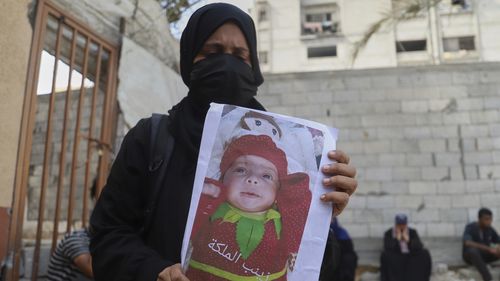Share this @internewscast.com
Some readers may find the details in this story distressing
A mother pressed a final kiss to what remained of her five-month-old daughter and wept.
Esraa Abu Halib’s baby now weighed less than when she was born.
On a bright street in war-torn Gaza, a bundle containing Zainab Abu Halib marked the most recent death due to starvation following 21 months of conflict and Israeli restrictions on humanitarian aid.

Under international pressure, Israel slightly eased the blockade in May.
Since that time, approximately 4500 trucks have been allowed in by Israel for the UN and other aid organizations to distribute, which includes 2500 tons of baby food and specially formulated high-calorie food for children, according to Israel’s Foreign Ministry last week.
Israel says baby formula has been included, plus formula for special needs.
The average of 69 trucks a day, however, is far below the 500 to 600 trucks a day the UN says are needed for Gaza.
The UN says it has been unable to distribute much of the aid because hungry crowds and gangs take most of it from its arriving trucks.
Separately, Israel has backed the US-registered Gaza Humanitarian Foundation, which in May opened four centres distributing boxes of food supplies.
The UN human rights office reports that over 1000 Palestinians have been killed by Israeli forces since May while attempting to obtain food, mostly around these new aid distribution areas.
Much of Gaza’s population now relies on aid.
“There was a shortage of everything,” the mother of Zainab said as she grieved.
“How can a girl like her recover?”
Late on Saturday, Israel’s foreign ministry announced that a humanitarian pause would begin on Sunday morning in parts of Gaza to allow for more aid delivery, and it added: “Israel rejects the false accusations of ‘starvation’ propaganda initiated by Hamas which manipulates pictures of children suffering from terminal diseases. It is shameful.”











